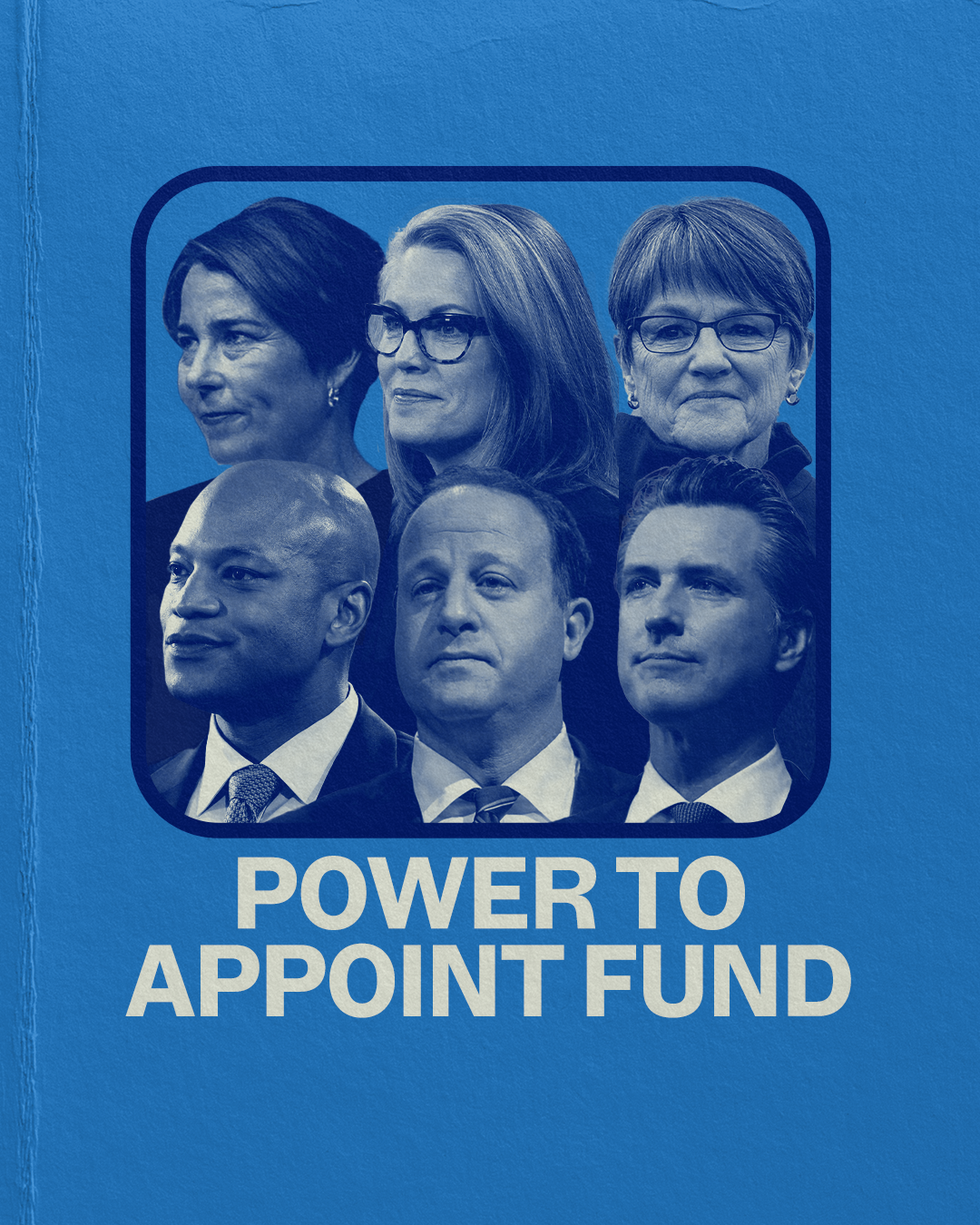
Can you donate now to join our fight?
We just launched the Power to Appoint Fund to highlight the important role Dem Govs play to ensure integrity in our country’s judicial process and protect fundamental freedoms. Your support will ensure we can make crucial investments in key states and protect our democracy. Please don’t wait: rush your gift to elect Democratic governors! >>>
ICYMI: Democratic Governors Are the Last Line of Defense Against Voting Rights “Armageddon”
As Republicans across the country launch unprecedented attacks on voting rights, New York Magazine explains how Democratic governors on the ballot in 2021 and 2022 could be the last line of defense against this voting rights “armageddon.”
Republicans have introduced 253 bills in 43 states seeking to limit voting rights and disenfranchise minority voters, low-income voters, and young people. Republican state legislatures are also trying to influence the redistricting process in attempts to tip the scales in their favor.
The future of voting rights is on the ballot for governor in 2021 and 2022.
In Virginia, Gov. Ralph Northam and Virginia Democrats have championed a bill that will make Virginia the first state in the South to pass its own Voting Rights Act. Republican gubernatorial candidates like Pete Snyder, Amanda Chase, Kirk Cox, and Glenn Youngkin are threatening to roll back the progress Democrats have made and continue to trumpet election conspiracy theories.
In New Jersey, Gov. Phil Murphy has restored voting rights for 80,000 people and made it easier to vote during the pandemic. Like Republicans across the country, likely Republican gubernatorial nominee Jack Ciattarelli has endorsed restrictive voting laws like voter ID requirements and purging voters from registration rolls in an effort to demonstrate his loyalty to Trump.
Georgia has emerged as ground zero for voting attacks, where Republicans have introduced a laundry list of bills seeking to limit Georgians’ right to vote and disenfranchise Black voters who propelled President Biden and Senators Jon Ossoff and Raphael Warnock to victory. As a former Secretary of State, GOP Gov. Brian Kemp has a history of pushing for voter suppression proposals.
In Wisconsin, Gov. Tony Evers is the last thing standing against the Wisconsin GOP’s efforts to tighten voting laws. Just last week, Wisconsin Republicans introduced a number of ridiculous proposals, including drowning voters in paperwork when they apply for an absentee ballot, barring staff at assisted living sites from reminding residents of an upcoming election, imposing photo ID requirements, restricting drop boxes to one per municipality, and more.
Read more about Republican efforts to suppress voting and how Democratic governors are stopping them below.
Intelligencer: 2022 Governors Races Could Be Armageddon for Voting Rights
The big 2021 political story, aside from efforts to end and recover from the COVID-19 pandemic, is a guerrilla war over voting rights. Across the country, drawing inspiration from Donald Trump’s lies about voter fraud, Republican-controlled legislatures are battling to restrict the franchise in ways almost too numerous to count (though the Brennan Center for Justice is trying to keep up).
It’s no accident that some of the most intense voter-suppression activity is in states narrowly carried by Joe Biden in 2020 but where Republicans hold a governing trifecta, namely Arizona and Georgia. In these two states they are entirely able to enact voting restrictions with Democrats left howling on the outside. If the GOP can overcome its own divisions, and not write laws so stupidly that the courts will strike them down, they can perhaps hold off or reverse blue trends simply by shrinking the electorate. Or so they hope. They also hope to head off Democratic efforts to preempt state voter suppression activity via a restored Voting Rights Act or the much more definitive legislation already passed by the U.S. House in H.R. 1, the For the People Act (both likely doomed in the Senate unless there is filibuster reform).
At the same time, Republican-controlled legislatures and governors will seek to use their power to exploit the decennial redistricting process and tilt the scales even further in their direction in future U.S. House and state legislative contests. Two highly contested states with Republican-controlled legislatures, Arizona and Michigan, have independent commissions that play a key role in redistricting. But in Georgia, and reasonably competitive Florida and New Hampshire, redistricting is an all-Republican show. Add in the historical phenomenon that midterm elections tend to produce wind beneath the sails of the party that does not control the White House, and you can see that 2022 could be a pretty good Republican year nationally, especially if voting restrictions are adopted widely.
But the future of voting rights, and in turn of the partisan balance, in many states will be on the ballot in 2022 as well. There are a number of highly competitive states where a Democratic governor is the only thing standing between Republicans and further screwing around with the franchise, such as Michigan, North Carolina, Pennsylvania, and Wisconsin. Since state legislatures tend to shift ground more slowly than governorships (particularly in the first year after redistricting, which usually solidifies incumbents), 2022 gubernatorial races could represent a huge battle that will both reflect and intensify the fight over who gets to vote and how, along with a vast array of other policy issues dividing the two major parties. Let’s look at a few examples:
Georgia’s GOP legislature is on the brink of passing an assortment of new voting restrictions limited only by their internal divisions over the best way to make voting harder for Democrats (which in Georgia means harder for Black voters) without discommoding their own voters. But the battle will bleed quickly over into the 2022 gubernatorial race, which is expected to be a rematch (and most definitely a grudge match) between Democrat Stacey Abrams and Republican incumbent Brian Kemp.
[…]
Democratic governor Tony Evers is eligible for another term, and will presumably run without intra-party opposition. But the Republican field has been temporarily frozen by the ambivalence of GOP senator Ron Johnson about his 2022 plans. If RonJon runs again, the gubernatorial race could get crowded, with Lieutenant Governor Rebecca Kleefisch, Congressman Mike Gallagher, former congressman Sean Duffy, former Senate candidate Kevin Nicholson, and Waukesha County executive Paul Farrow, all mulling bids. So, too, is a very familiar face: former RNC chairman and White House chief of staff Reince Priebus.
While there will likely be some efforts among Republicans to out-conservative each other, this is a state where partisan divisions are so bitter and voting coalitions are so competitive that ideological issues are usually cast in the shade. Evers defeated every Wisconsin Democrat’s bête noire, Scott Walker, by only 29,000 votes, and the last two presidential elections in the state were decided by fewer votes than that.
[…]
There are off-year gubernatorial elections this year in two states. In New Jersey, incumbent Democrat Phil Murphy is strongly favored for reelection over his likely Republican opponent, former legislator and unsuccessful 2017 gubernatorial primary candidate Jack Ciattarelli. And in Virginia, where Democratic Governor Ralph Northam is term-limited, his predecessor, Terry McAuliffe, is the front-runner to reclaim the job, though he faces multiple primary opponents (including scandal-plagued Lieutenant Governor Justin Fairfax). Virginia Republicans decided to hold a nominating convention instead of a primary to head off the candidate who calls herself “Trump in high heels,” Amanda Chase.
[…]

